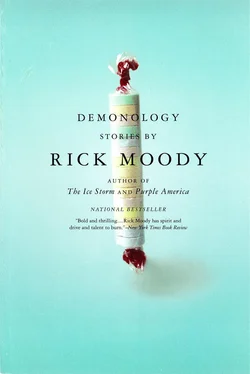* * *
When they arrived home, these monsters, disgorged from their dads Jeep, there was a fracas between girl and boy about which was superior (in the Aristotelian hierarchies), Milky Way, Whoppers, Slim Jim, Mike ’n Ikes, Sweet Tarts, or Pez — this bounty counted, weighed, and inventoried (on my nieces bed). Which was the Pez dispenser of greatest value? A Hanna-Barbera Pez dispenser? Or, say, a demonic totem pole Pez dispenser? And after this fracas, which my sister refereed wearily (Look, if he wants to save the Smarties, you cant make him trade!), they all slept, and this part is routine, my sister was tired as hell; she slept the sleep of the besieged, of the overworked, she fell precipitously into whorls of unconsciousness, of which no snapshot can be taken.
In one photograph, my sister is wearing a Superman outfit. This, from a prior Halloween. I think it was a Supermom outfit, actually, because she always liked these bad jokes, degraded jokes, things other people would find ridiculous. (She’d take a joke and repeat it until it was leaden, until it was funny only in its awfulness.) Jokes with the fillip of sentimentality. Anyway, in this picture her blond hair — brightened a couple of shades with the current technologies — cascades around her shoulders, disordered and impulsive. Supermom. And her expression is skeptical, as if she assumes the mantle of Supermom — raising the kids, accepting wage-slavery, growing old and contented — and thinks it’s dopey at the same time.
Never any good without coffee. Never any good in the morning. Never any good until the second cup. Never any good without freshly ground Joe, because of my dad’s insistence, despite advantages of class and style, on instant coffee. No way. Not for my sister. At my dad’s house, where she stayed in summer, she used to grumble derisively, while staring out the kitchen windows, out the expanse of windows that gave onto the meadow there, Instant coffee! There would be horses in the meadow and the ocean just over the trees, the sound of the surf and instant coffee! Thus the morning after Halloween, with my nephew the shark (who took this opportunity to remind her, in fact, that last year he saved his Halloween candy all the way till Easter, Mommy) and my niece, the Little Mermaid, orbiting around her like a fine dream. My sister was making this coffee with the automatic grinder and the automatic drip device, and the dishes were piled in the sink behind her, and the wall calendar was staring her in the face, with its hundred urgent appointments, e.g., jury duty (the following Monday) and i? & A to pediatrician; the kids whirled around the kitchen, demanding to know who got the last of the Lucky Charms, who had to settle for the Kix. My sister’s eyes barely open.
Now this portrait of her cat, Pointdexter, twelve years old — he slept on my face when I stayed at her place in 1984 —Pointdexter with the brain tumor, Pointdexter with the phenobarbital habit. That morning — All Saints’ Day — he stood entirely motionless before his empty dish. His need was clear. His dignity was immense. Well, except for the seizures. Pointdexter had these seizures. He was possessed. He was a demon. He would bounce off the walls, he would get up a head of steam, mouth frothing, and run straight at the wall, smack into it, shake off the ghosts, and start again. His screeches were unearthly. Phenobarbital was prescribed. My sister medicated him preemptively before any other chore, before diplomatic initiatives on matters of cereal allocation. Hold on you guys, I’ll be with you in a second. Drugging the cat, slipping him the Mickey Finn in the Science Diet, feeding the kids, then getting out the door, pecking her boyfriend on the cheek (he was stumbling sleepily down the stairs).
She printed snapshots. At this photo lab. She’d sold cameras (mnemonic devices) for years, and then she’d been kicked upstairs to the lab. Once she sold a camera to Pete Townshend, the musician. She told him — in her way both casual and rebellious — that she didn’t really like The Who. Later, from her job at the lab, she used to bring home other peoples pictures, e.g., an envelope of photographs of the Pope. Had she been out to Giants Stadium to use her tele-photo lens to photograph John Paul II? No, she’d just printed up an extra batch of, say, Agnes Venditi’s or Joey Mueller’s photos. Caveat emptor. Who knew what else she’d swiped? Those Jerry Garcia pix from the show right before he died? Garcia’s eyes squeezed tightly shut, as he sang in that heartbroken, exhausted voice of his? Or: somebody’s trip to the Caribbean or to the Liberty Bell in Philly? Or: her neighbor’s private documentations of love? Who knew? She’d get on the phone at work and gab, call up her friends, call up my family, printing pictures while gabbing, sheet after sheet of negatives, of memories. Oh, and circa Halloween, she was working in the lab with some new, exotic chemicals. She had a wicked headache.
* * *
My sister didn’t pay much attention to the church calendar. Too busy. Too busy to concentrate on theologies, too busy to go to the doctor, too busy to deal with her finances, her credit-card debt, etc. Too busy. (And maybe afraid, too.) She was unclear on this day set aside for Gods awesome tabernacle, unclear on the feast for the departed faithful, didn’t know about the church of the Middle Ages, didn’t know about the particulars of the Druidic ritual of Halloween — it was a Hallmark thing, a marketing event — or how All Saints’ Day emerged as an alternative to Halloween. She was not much preoccupied with nor attendant to articulations of loss, nor interested in how this feast in the church calendar was hewn into two separate holy days, one for the saints, that great cloud of witnesses, one for the dearly departed, the regular old believers. She didn’t know of any attachments that bound together these constituencies, didn’t know, e.g., that God would wipe away all tears from our eyes and there would be no more death, according to the evening’s reading from the book of Revelation. All this academic stuff was lost on her, though she sang in the church choir, and though on All Saints’ Day, a guy from the church choir happened to come into the camera store, just to say hi, a sort of an angel (let’s say), and she said, Hey Bob, you know, I never asked you what you do.
To which Bob replied, I’m a designer.
My sister: What do you design?
Bob: Steel wool.
She believed him.
She was really small. She barely held down her clothes. Five feet tall. Tiny hands and feet. Here’s a photo from my brothers wedding (two weeks before Halloween); we were dancing on the dance floor, she and I. She liked to pogo sometimes. It was the dance we preferred when dancing together. We created mayhem on the dance floor. Scared people off. We were demons for dance, for noise and excitement. So at my brother’s wedding reception I hoisted her up onto my shoulder, and she was so light, just as I remembered from years before, twenty years of dances, still tiny, and I wanted to crowd-surf her across the reception, pass her across upraised hands, I wanted to impose her on older couples, gentlemen in their cummerbunds, old guys with tennis elbow or arthritis, with red faces and gin blossoms; they would smile, passing my sister hither, to the microphone, where the wedding band was playing, where she would suddenly burst into song, into some sort of reconcil-iatory song, backed by the wedding band, and there would be stills of this moment, flashbulbs popping, a spotlight on her face, a tiny bit of reverb on her microphone, she would smile and concentrate and sing. Unfortunately, the situation around us, on the dance floor, was more complicated than this. Her boyfriend was about to have back surgery. He wasn’t going to do any heavy lifting. And my nephew was too little to hold her up. And my brother was preoccupied with his duties as groom. So instead I twirled her once and put her down. We were laughing, out of breath.
Читать дальше












